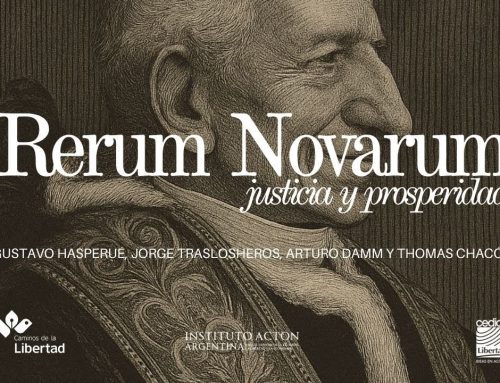Por Samuel Gregg
Fuente: Acton Institute PowerBlog
22 de noviembre de 2022
We are men, not gods, and so utopia will always remain a dream, disappointing historians and economists of all stripes. But that is no reason to despair.
As far as centuries go, the 20th was remarkable for many things, not least among which were wars fought on a scale unprecedented for their destructiveness, as well as convulsive debates about economics and economic policy.
In the case of the latter, the 20th century witnessed economics emerging from being a side discipline taught in law faculties to a social science widely seen as giving us tools to master, or at least understand, the economic destinies of entire nations. Figures like John Maynard Keynes speculated about the possibility of resolving what he called the economic problem once and for all, ushering in a period of virtually uninterrupted economic prosperity around the world.
The pursuit of different ways of realizing that end forms the backdrop to Slouching Towards Utopia: An Economic History of the Twentieth Century. Its author, J. Bradford DeLong, has worked in the gardens of academia as a distinguished economist and economic historian as well as the trenches of economic policy, most notably during the Clinton administration. There DeLong contributed to the development of the generally free-trade approach of President Bill Clinton as well as the relatively benign view of markets and more-or-less market-orientated economic policies that prevailed in the years when the triumvirate of Robert Rubin, Alan Greenspan, and Lawrence H. Summers (what Time magazine called “The Committee to Save the World”) presided over economic good times for the United States.
At the time, economic globalization was widely spoken of as “inevitable.” That rather deterministic view of the world wasn’t, however, the only utopian economic illusion that proliferated in the 20th century. The very purpose of Communist parties, according to Lenin, was to seize power to accelerate the unavoidable workings of the economic and historical dynamics that would eventually bring about Communism. Likewise, assorted theorists from a variety of left and right standpoints proposed economic ideas ranging from corporatism to autarky as ways to banish poverty and economic turbulence to the past.
None of this came to pass, and one of the purposes of DeLong’s 605-page book is to detail how things didn’t quite turn out the way that so many people expected. He does so through the exposition of a “grand narrative” that covers what he calls “the long twentieth century”—1870 until 2010.
DeLong regards this period as “the most consequential years of all humanity’s centuries.” I would quibble with that. The 13th and 18th centuries, I’d argue, were in many respects far more important, for better and for worse. But DeLong is surely right to maintain that the 20th century was the century in which economics and economists exercised an unprecedented influence, again for better and worse, in public life.
DeLong’s objective is to explain how particular events, ideas, technologies, and personalities managed to produce an unprecedented explosion of wealth that radically diminished poverty around the world in a relatively short period of time. Alongside this growth, however, DeLong observes that many people remained deeply dissatisfied amid all this wealth, especially toward the end of the time period he covers. This question leaves many people puzzled until, of course, you grasp that people are much more than simply material beings and often concerned with questions for which the material dimension of life cannot provide answers.
Slouching Towards Utopia has a great deal to commend it. Writing such histories is a difficult exercise, and DeLong himself acknowledges that it often means oversimplification. “In pursuit of big themes,” he writes, “details necessarily suffer.” Nonetheless, grand narratives, DeLong argues, are necessary “if we are to think at all.” It is how you transcend what he calls the “nonsense”—fuzziness, the propensity to confusion, etc.—that preoccupies human thought. It is through grand narratives, according to DeLong, that you see what really matters.
There’s much truth to that thesis. In DeLong’s case it allows him to focus on the role played by technology and our capacity for organization in driving economic development forward. “The research laboratory, the corporation, and globalization,” he argues, “powered the wave of discovery, invention, innovation, deployment, and global economic integration” that has “so boosted our global-useful-economic-knowledge index.” It has enabled millions to escape what John Stuart Mill deemed the “drudgery and imprisonment” in which most people were still locked in the 1870s, despite the stupendous advances associated with the Industrial Revolution and, I would insist, the revolution initiated by Adam Smith’s Wealth of Nations.
DeLong sums up the primary features of his grand narrative around five major themes: (1) “History became economic,” (2) “The world globalized,” (3) “The technological cornucopia was the driver,” (4) “Governments mismanaged, creating insecurity and dissatisfaction,” and (5) “Tyrannies intensified.” With some qualifications, I think this is a good summary of some major trends of DeLong’s century. His book seeks to unfold each of these tendencies in a way that show how they intersect, and in which the author shifts from economics to political economy and back again with ease.
Whether you agree with DeLong’s analysis and conclusions, his book makes for an entertaining read that is accessible to nonspecialists—perhaps too much so. At times the text seems like a stream-of-consciousness monologue on a graduate student’s blog, in which a desire to be witty counts for more than careful elaboration and explanation of history, theory, and facts—economic and otherwise.
On many occasions, I found this a little tedious. Lines like “It is hard … to read Marx without being reminded of the Great Voice heard by John the Theologian, inspired by the magic mushrooms of the Island of Patmos” sound not only like a sophomoric undergraduate trivializing a first-century figure whom he plainly knows little about. It’s also a distraction from DeLong’s important point: that Marxism functioned for millions of people in the 20th century as a fideistic form of religion.
Much more could be said about both DeLong’s writing style and, more importantly, the substance of his grand narrative. But the overall impression I drew from the book was that this was history written by a disappointed man. On the one hand, DeLong marvels at how anyone “in any previous century … would not be amazed and incredulous at seeing humanity’s technological powers as of 2010?” He then adds, however, that they would proceed to ponder another question: “Why, with such godlike powers to command nature and organize ourselves, have we done so little to build a truly human world, to approach within sight of any of our utopias?”
DeLong is surely right that a visitor from, say, 1800 might indeed ask such a question. But that same person would, I suspect, also be more inclined to understand that humans are in fact not gods: that we are deeply fallible beings. Consequently, there are no utopias in this world.
That’s why I for one am suspicious of any economist—be they neo-Keynesian, Marxist, or market liberal—who purports to have discovered an economic set of ideas or programs that has a chance of leading to something like Heaven on Earth. For there is no truly human world in which any utopia reigns.
That’s not a reason to not strive for (or even slouch towards) a better world. Good economics can be an immensely powerful tool for realizing more humane living conditions. It’s merely to recognize certain truths about human nature and the human condition and to relativize the significance of politics (which functions as a real religion for far too many people these days) in human life. It is also to understand that attempts to realize cosmic visions of justice in the here-and-now invariably lead to destruction and death in the here-and-now.
That last point is surely the lesson of the 20th century, one that economists and economic historians would do well to keep in mind.





Deja tu comentario